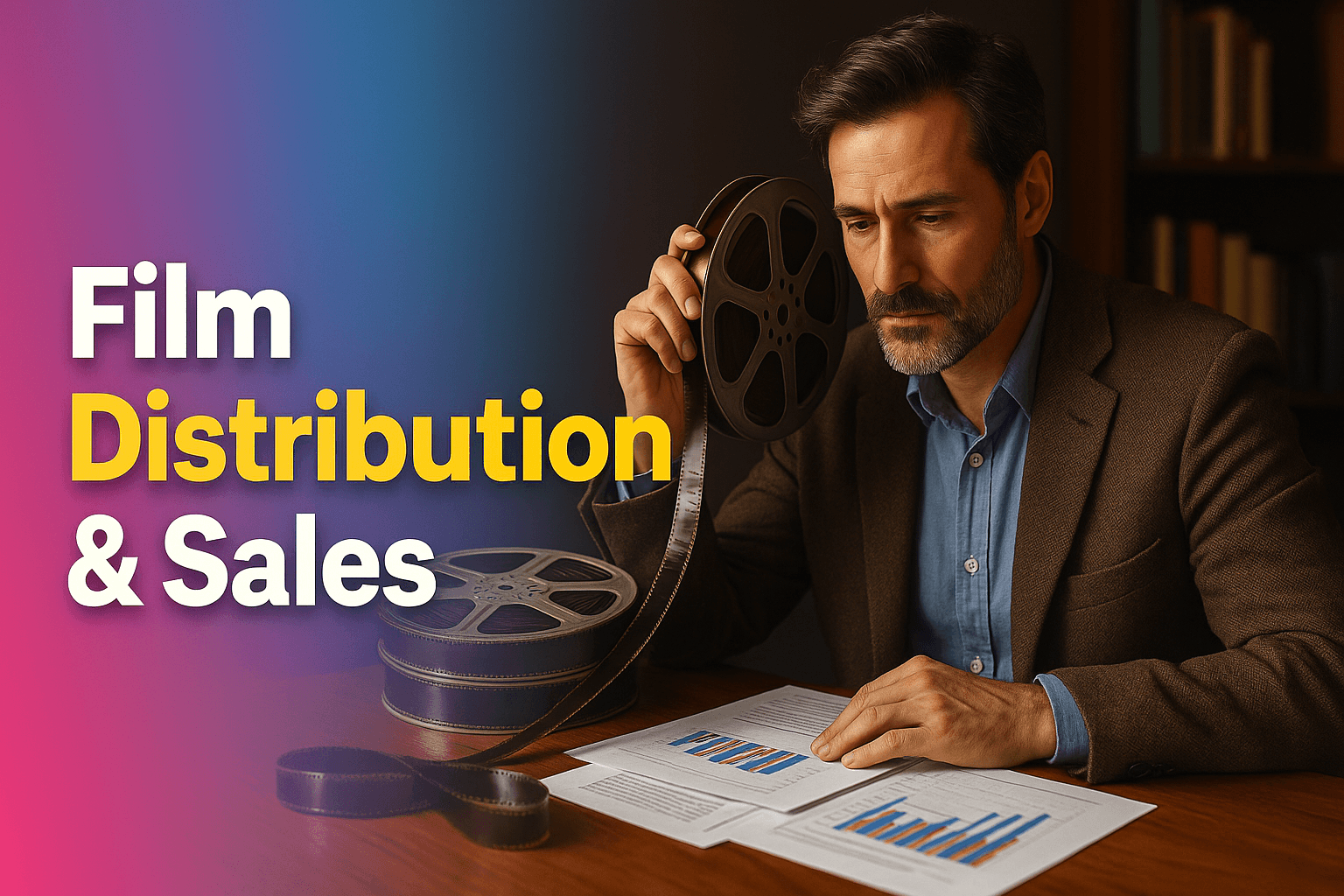The Strategic Necessity of a Film Distribution Sales Leads Database

Introduction
In my analysis, a film’s journey from a creative vision to a commercial asset is defined by its sales strategy. Yet, for many executives, this critical process is hindered by a fundamental problem: a lack of a single, authoritative film distribution sales leads database. Relying on outdated festival catalogs, fragmented spreadsheets, or a limited personal network is a high-risk gamble.
This approach leads to missed opportunities, wasted time, and the very real possibility of a project failing to find its audience. This guide explores why a professional, data-driven solution is not a luxury—it’s the cornerstone of a profitable and scalable sales operation. It’s about moving beyond guesswork and toward a strategic, data-backed approach that secures your film’s place in the global marketplace.
Table of content
Key Takeaways
| Core Challenge | The film sales ecosystem is fragmented and relies on outdated methods for lead generation, leading to inefficient processes, inaccurate contact information, and missed opportunities. |
| Strategic Solution | A specialized film distribution sales leads database provides a single source of truth with verified contacts, company profiles, and project data, transforming a manual, reactive process into a precise, proactive sales strategy. |
The Challenge: The Fragmented Film Sales Landscape
For decades, the film sales process has been a highly manual, relationship-driven affair. Producers and sales agents relied on physical market guides, printed film directories, and a web of personal connections built over years of attending festivals and markets.
While relationships remain vital, this traditional model is no longer sufficient in a globalized, fast-paced market. The core problems with this approach are twofold: a lack of accuracy and a lack of scalability.
Outdated and Inaccurate Data: The most common pain point is the constant churn of the industry. Executives change roles, companies are acquired, and contact information becomes obsolete almost as soon as it’s printed. A cold email sent to a generic info@ or a phone call to a disconnected number is not just a waste of time—it is a lost opportunity to connect with the right decision-maker. As a 2025 report from Sales handy states, “70% of your outreach success depends on one thing — accurate contact data.”
This data point alone underscores why a simple Google search or a festival catalog is an inadequate substitute for a professional film distribution sales leads database. This is the primary reason for a staggering amount of wasted effort in the sales pipeline.
Fragmented Information: A single film sales lead requires multiple data points: the company’s name, the correct executive, their specific title (e.g., Head of Acquisitions, VP of Sales), their contact information, and their history of acquiring similar films. This data is scattered across different sources—IMDb, corporate websites, LinkedIn, and countless individual spreadsheets.
Manually consolidating this information is a full-time job and a major drain on resources that should be focused on deal-making. My analysis indicates that this manual effort is the single biggest bottleneck in a modern film sales pipeline, costing teams countless hours and leading to missed windows of opportunity.
For example, a post on the r/Filmmakers subreddit highlights a common frustration:
“We missed countless opportunities for us to drum up some hype and awareness” because the distributor failed to communicate an upcoming release on a new platform, a problem that could be avoided with a centralized, data-driven system.
Essential Features of a Modern Film Distribution Sales Leads Database
A true film distribution sales leads database is more than a list of names. It is a strategic intelligence tool designed to solve the challenges of a fragmented industry. From my perspective, an effective database must possess the following core features:
- Verified Contact & Company Profiles: This is the most fundamental feature. The database must contain accurate, up-to-date information on companies and the executives who work there. It should provide direct emails and phone numbers, bypassing gatekeepers and allowing for direct outreach to the right person.
- Comprehensive Company & Executive Data: A good database provides rich context. For a company, this includes its business type (sales agent, distributor, aggregator), its genre specialization (e.g., horror, documentary, comedy), and its regional focus (e.g., Latin America, Europe, Asia). For an executive, it includes their title, department, and a history of their professional movements.
- Project & Deal History: The gold standard in a leads database is the ability to see a company’s or an executive’s deal history. You need to know what films a sales agent has sold in the past and which films a distributor has acquired. This data allows for precision targeting: a pitch for an arthouse drama should go to an acquisitions executive who has a track record of acquiring arthouse dramas.
- Advanced Filtering & Search: The database must allow for sophisticated search queries. As indicated by industry reports on B2B sales databases, the ability to use more than 65 targeting options is now an industry standard. A user should be able to filter leads by multiple criteria simultaneously, such as “all sales agents that represent sci-fi films and are located in Los Angeles.” This turns a long, daunting list into a highly targeted and actionable set of leads.
The Strategic Benefits of Using a Film Distribution Sales Leads Database
Implementing a professional film distribution sales leads database transforms the sales process from a reactive, time-intensive task into a proactive, efficient engine. The benefits are measurable and directly impact the bottom line:
- Dramatically Shorten the Sales Cycle: Less time spent on research means more time spent on outreach and negotiation. By providing a clean, pre-qualified list of leads, a database allows sales teams to focus on what they do best: closing deals. As reported by Research And Markets, the global film distribution market is projected to grow from $96.09 billion in 2024 to an estimated $114.05 billion by 2029. This growth underscores the need for a scalable, efficient system to capture market share.
- Maximize ROI on Your Sales Efforts: Every cold email sent to the wrong person is a wasted effort. By targeting the right companies and executives from the start, you increase your chances of getting a response and securing a deal. This targeted approach ensures that your marketing and sales resources are spent with maximum effectiveness.
- Gain a Competitive Edge: In a crowded market, knowing who to talk to is your biggest advantage. A comprehensive database provides competitive intelligence—insight into which projects your competitors are working on and who they are pitching to. This allows you to position your film strategically and find untapped opportunities. The use of AI in content recommendation systems and predictive analytics is a major trend in the industry, and a robust leads database is a critical component of that data-driven ecosystem.
- Build a Scalable Sales Pipeline: A manual sales process is difficult to scale. A database, however, provides a centralized, scalable solution that can be used by an entire team. It ensures a consistent, repeatable process for lead generation, from a single producer to a large-scale sales agency.
Vitrina: Your Partner in Modern Film Distribution
The challenges of finding a reliable film distribution sales leads database are precisely what Vitrina was built to solve. Our platform is a specialized, AI-powered intelligence solution for the global entertainment industry.
We provide the verified data and strategic insights necessary to turn a manual, outdated sales process into a precise and profitable operation by:
- Providing the Most Comprehensive Database: Our platform profiles over 300,000 companies and 3 million executives, making it a powerful resource for sourcing leads. You can find and filter sales agents, distributors, and a wide range of other partners based on their core capabilities, genre, and geographic focus.
- Offering Verified & Real-Time Intelligence: We continuously update our data to ensure the highest level of accuracy. This means you’re not reaching out to outdated contacts but connecting with the right decision-makers at the right time. Learn how Vitrina transforms the entertainment supply chain.
- Delivering Competitive & Market Insights: Vitrina’s Projects Tracker provides real-time intelligence on thousands of films in development and production globally. This allows you to analyze market trends and identify what projects are getting traction, providing you with the strategic foresight to make better decisions.
Conclusion: From Manual Labor to Market Leadership
A film’s commercial success hinges on its ability to find the right buyers. My analysis shows that a modern film distribution sales leads database is no longer just a tool but a strategic imperative. The transition from a manual, fragmented process to an efficient, data-driven one is what separates market leaders from those who get left behind.
By leveraging a specialized platform, producers and sales executives can reclaim time, eliminate guesswork, and build a scalable pipeline for success. In the end, it’s not just about a list of names—it’s about having a strategic intelligence tool that provides the clarity and precision needed to secure your film’s profitable future.
Frequently Asked Questions
A sales agent acts as a producer’s representative, selling a film’s rights to distributors in different territories. A distributor buys those rights for a specific territory and handles the film’s marketing and release to the public. In short, a sales agent sells to distributors, while a distributor sells to the audience.
The most effective way to find a film distributor is to first secure a sales agent, who has the relationships and expertise to sell your film to distributors. If you are self-distributing, you can use specialized databases to identify distributors that have a track record of acquiring films in your genre and territory. Attending film markets and festivals is also a key part of this process.
A professional film distribution sales leads database includes a variety of verified data points to help you make informed decisions. This typically includes accurate contact information for key executives (emails, titles, departments), detailed company profiles (business type, genre specialization, regional focus), and, in advanced systems, a history of projects and deals that the company or executive has been involved with. This context is crucial for targeted outreach.
Yes, in fact, a leads database can be even more critical for a smaller production company or indie filmmaker. These organizations often lack the extensive network of larger studios. A database provides a direct, data-backed path to finding the right contacts, eliminating the need for expensive travel to every film market and festival. It turns what would be a time-consuming, manual process into a precise, scalable sales strategy, leveling the playing field with larger competitors.

























